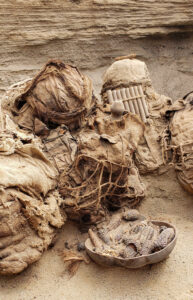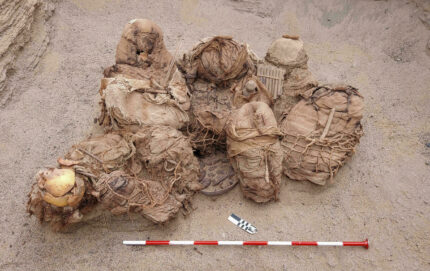 Last week, workers installing new gas pipes in the town of Chilca, 40 miles south of Lima, Peru, discovered a group of funerary bundles containing human remains and offerings that dates to the 13th century. The natural gas company Cálidda contracted archaeologists to excavate the find. They found the remains of eight individuals, adults and children, wrapped with vegetable ropes and brown cloth.
Last week, workers installing new gas pipes in the town of Chilca, 40 miles south of Lima, Peru, discovered a group of funerary bundles containing human remains and offerings that dates to the 13th century. The natural gas company Cálidda contracted archaeologists to excavate the find. They found the remains of eight individuals, adults and children, wrapped with vegetable ropes and brown cloth.
 Placed around the bundled bodies were offerings of different types of corn in a bowl made from gourds, decorated textiles and musical instruments, including a double-row panpipe and a traditional Peruvian flute. There were shells on the heads of some of the bodies.
Placed around the bundled bodies were offerings of different types of corn in a bowl made from gourds, decorated textiles and musical instruments, including a double-row panpipe and a traditional Peruvian flute. There were shells on the heads of some of the bodies.
Inside some of the bundles archaeologists found hand spindles, used to spin cotton, camelid or sheep’s wool into the richly colored and patterned textiles that have been characteristic of Andean culture for millennia. They also found chuspas, pouches used to carry coca leaves and the alkaline substances (lime in this case) they were chewed with to increase the practice’s effectiveness against altitude sickness, in some of the bundles.
The bundles were placed inside a chamber dug into the sand, then topped with wood logs and mats of plant fiber hardened with mud. Archaeologists believe the burials were part of a pre-Hispanic cemetery in Chilca, as bodies have been found during utility work before, most recently in 2018 when Cálidda workers discovered the ancient remains of 30 individuals.
The human remains and archaeological materials will be entrusted to experts at Peru’s Ministry of Culture, who will assess their conservation needs and determine where they will be exhibited in the future.
